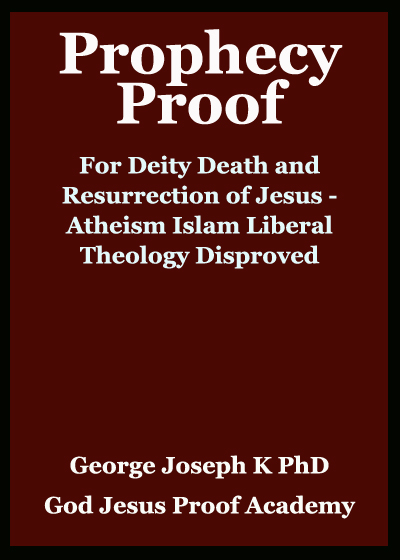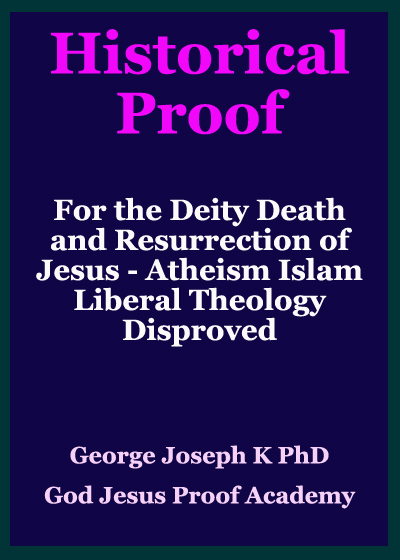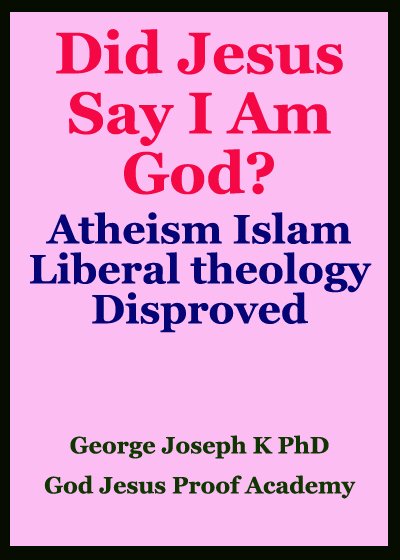The Deception by Liberal Theology – Fake Theologians Made Theology not only Useless but also Dangerous
MODERNIZING CHRISTIAN MESSAGE – FAULTY STEP BY THE DECIEVED THEOLOGIANS. Schleiermacher and Hegel struggled with the same issue: how can we be modern and Christian at the same time? Schleiermacher's solution was to go beyond rationalism and deism of the Enlightenment to a new synthesis of modern philosophy and historic Christian dogma. Thus liberal theology was born as a result of the faulty effort to contextualize and reshape the Christian message to suit the situation. The liberal Protestants accepted the viewpoint of the Romantic philosophy of religion set out by Schleiermacher namely, that the real subject-matter of theology is not the divinely revealed truths from God, but the human religious experience. HERE BEGAN THE BIG MODERN FALL. Here man becomes the focus point of the theologians. Scripture is viewed, not as a divinely given record of a divinely given revelation, but as a mere record of the religious experience of the Hebrews. Thus we have landed in subjectivism. This is a radical perversion of Christianity. As a result of this faulty method in theology, theologians gave all those doctrines which modern man found difficult to believe. Thus they denied the existence of sin, devil and hell. They offered revisions of the doctrine and the rejection of what the church had affirmed throughout its long history.
liberal theology IS GODLESS PHILOSOPHy’S VIEW ABOUT THE BIBLE . The theologians succumbed before the worldly philosophy. They accepted the presuppositions of the anti-God, anti-Bible modern philosophy. They failed to look at the secular philosophy through the glasses of the Bible. Rather they bowed before secular philosophers and secular philosophy only to their own destruction. This trend gradually and ultimately led to the weakening of the church, disillusionment of the believers, revival of Islam and Hinduism and new age movement.
HIGHER CRITICISM AND LIBERAL THEOLOGY ARE DEMONIC. PHILOSOPHY. SECULAR PHILOSOPHERS WERE THE ORIGINATORS OF HIGHER CRITICISM AND LIBERAL THEOLOGY. Bacon, Hobbes, Descartes, and Hume laid the foundations modern beliefs such as inductive thought as the only source of knowledge, denial of revelation, separation of faith and reason, doubt as the foundation of knowledge. Hobbes and Hume established the foundations for criticism of miracles. Spinoza inaugurated the biblical criticism of both Old and New Testaments. Lessing invented the synoptic problem. Kant’s critique of reason became the basic norm for historical-critical theology. Hegel furnished the means for the process of demythologizing that Bultmann would implement later. Kierkegaard reduced faith to a leap that left rationality behind. Heidegger reduced Christian faith to self-understanding. From Karl Marx came the theologies of revolution and liberation. Such biblical criticism meant the abandonment of the belief that the Bible is an infallible record of divine revelation to men.
THEOLOGIANS DID THE ADULTEROUS TASK OF MIXING THE BIBLE WITH GODLESS PHILOSOPHY – THUS THEOLOGIANS BECAME LIBERAL IN THEIR APPROACH. Much of our modern theology is founded upon philosophical ideas from Aristotle and Plato. Theologians were trying to synthesize Greek Philosophy and Biblical Teaching. They took the Bible in one hand, and the ideas of Aristotle and Plato in the other, and put the two together to develop our Christian beliefs. There were some Early Church Fathers who did not think this was wise and argued against such a combining of Biblical teaching and Greek Philosophy. One such person was Tertullian. Martin Luther shared the same feelings toward philosophy, calling it “the Devil’s whore.”
HIGHER CRITICS AND LIBERAL THEOLOGIANS WERE RATIONALISTS, ANTI-SUPERNATURALISTS AND ATHEISTS WHO DENIED THE REVELATION IN THE BIBLE. These theologians had a strong bias against the supernatural. Some of them had no faith in the God of the Bible. They had no faith in either the necessity or the possibility of supernatural revelation. They were clearly opposed to the miraculous. Thus the formative forces of the Higher Critical movement were rationalistic forces. Kuenen and Wellhausen are accepted as masters by the "higher critics". They deny the supernatural element in the Old Testament. This is the "presupposition" of their entire position. Unbelief was the antecedent, not the consequent, of their criticism. Their theories were based on human reasoning. Their hypotheses were constructed on the assumption that Bible is false. According to Wellhausen the religion of Israel was simply a human religion.
Beware lest anyone cheat you through philosophy and empty deceit, according to the tradition of men, according to the basic principles of the world, and not according to Christ (Col 2:6-8).
FAULTY STEP BY LIBERAL THEOLOGIANS – SHIFT FROM OBJECTIVE REVELATION TO SUBJECTIVE EXPERIENCE AND FEELING. The liberal protestant theologians accepted the viewpoint of Schleiermacher, that the real subject-matter of theology is not the divinely revealed truths from God, but the human religious experience. HERE BEGAN THE BIG MODERN FALL. They began to view Bible not as a divinely given revelation of objective historical record, but as a mere record of the religious experience of the Hebrews. Thus the new faulty method in theology approach fell into mere subjectivism. Thus theologians rejected all the those doctrines which they found difficult to believe. Thus almost every doctrine which the church had affirmed throughout its long history was denied or questioned in the process.
THEOLOGY SHIFTING TO UNCERTAINTY AND THE ALL ARE RIGHT POSITION. For example, the existence of God could not be rationally demonstrated. But since man needed Him, that was proof that He existed. However, nothing could be inferred concerning His nature, attributes, or His relationship to the world. The God of the Christian might be Jesus Christ or he may believe in one or another kind of God. His God may not be Christian at all. It may be Jewish, as Jesus' God was. It may be neo-Platonic. It may be Stoic or Hindu. It may be Deistic. Although they profess to meet Christ in the pages of Scripture, they denied any knowledge of His preexistence, His atoning death, or second coming. Although Jesus was afforded the title "Son of God" and had divinity ascribed to Him, these were but titles of honor, communicating no ontological reality. Because such knowledge was beyond the realm of experience.
THE STUDY OF COMPARATIVE RELIGIONS DENY UNIQUENESS OF BIBLICAL FAITH. The gradual emergence of the study of comparative religions proved to be another threat to the distinctiveness of Christianity. The increase of cultural and religious knowledge came as a result of the colonization of the world by the Western European powers. Vast amounts of new knowledge about the world and competing cultures and their native religions became available. The burgeoning science of archaeology opened the past and now allowed for the Bible to be studied against its cultural milieu in a way that had not heretofore been possible. All religions were seen in their most basic form to lead to one truth (God) and to promote a common ethic of love for one’s neighbor. In Germany, comparative religions took the form of the History of Religions school which studied the religions of the nations surrounding Israel and foolishly concluded that Israelite religion had taken elements of the surrounding pagan beliefs and placed these within a structure of monotheism. For example, Israel’s tradition of creation and the flood were said to have been borrowed from the Babylonian culture. They held that Biblical faith in both its Old and New Testament expressions was not distinct and a result of supernatural revelation, but represented humanity’s evolving conceptions about God and religion.
THUS ULTIMATELY THEY MADE THEOLOGY NOT ONLY USELESS BUT EXTREMELY DANGEROUS. The existence of God cannot be rationally demonstrated. But since man needed God, that feeling of need was the proof that God existed. But nothing could be inferred concerning His nature, attributes, or His relationship to the world. The God of the Christian might be Jesus Christ or he may believe in one or another kind of God. This group of theologians denied the true Jesus of the Bible, His preexistence, His atoning death, or second coming. Ritschl focused on the kingdom of God which he identified with the ethical transformation of society and culture. Sin is societal and thus redemption is equated with the improvement of social structures. Ritschl united the emphases of Schleiermacher and to Kant, in a powerful new synthesis which attracted the pastors, theologians, social reformers etc. Whatever is not open to verification as part of the historical events of Jesus' life, were rejected. Even the relevance of an ongoing "personal relationship with Christ" was rejected. THUS, THEY MADE THEOLOGY NOT ONLY USELESS BUT EXTREMELY DANGEROUS.



